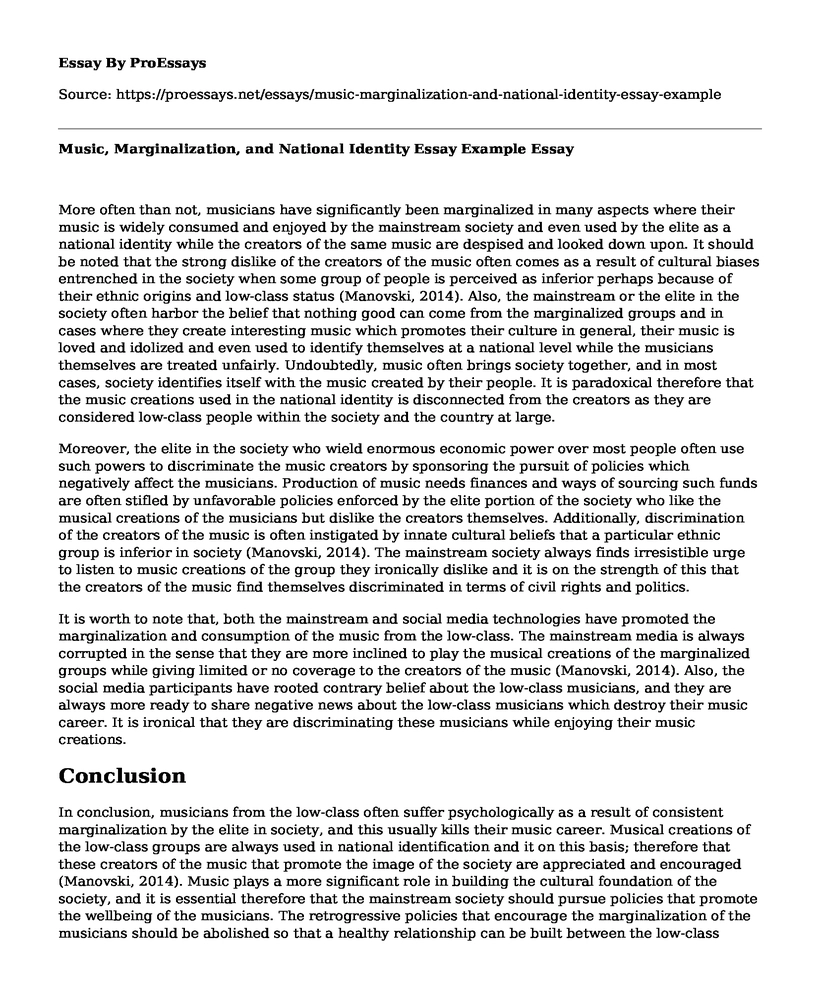More often than not, musicians have significantly been marginalized in many aspects where their music is widely consumed and enjoyed by the mainstream society and even used by the elite as a national identity while the creators of the same music are despised and looked down upon. It should be noted that the strong dislike of the creators of the music often comes as a result of cultural biases entrenched in the society when some group of people is perceived as inferior perhaps because of their ethnic origins and low-class status (Manovski, 2014). Also, the mainstream or the elite in the society often harbor the belief that nothing good can come from the marginalized groups and in cases where they create interesting music which promotes their culture in general, their music is loved and idolized and even used to identify themselves at a national level while the musicians themselves are treated unfairly. Undoubtedly, music often brings society together, and in most cases, society identifies itself with the music created by their people. It is paradoxical therefore that the music creations used in the national identity is disconnected from the creators as they are considered low-class people within the society and the country at large.
Moreover, the elite in the society who wield enormous economic power over most people often use such powers to discriminate the music creators by sponsoring the pursuit of policies which negatively affect the musicians. Production of music needs finances and ways of sourcing such funds are often stifled by unfavorable policies enforced by the elite portion of the society who like the musical creations of the musicians but dislike the creators themselves. Additionally, discrimination of the creators of the music is often instigated by innate cultural beliefs that a particular ethnic group is inferior in society (Manovski, 2014). The mainstream society always finds irresistible urge to listen to music creations of the group they ironically dislike and it is on the strength of this that the creators of the music find themselves discriminated in terms of civil rights and politics.
It is worth to note that, both the mainstream and social media technologies have promoted the marginalization and consumption of the music from the low-class. The mainstream media is always corrupted in the sense that they are more inclined to play the musical creations of the marginalized groups while giving limited or no coverage to the creators of the music (Manovski, 2014). Also, the social media participants have rooted contrary belief about the low-class musicians, and they are always more ready to share negative news about the low-class musicians which destroy their music career. It is ironical that they are discriminating these musicians while enjoying their music creations.
Conclusion
In conclusion, musicians from the low-class often suffer psychologically as a result of consistent marginalization by the elite in society, and this usually kills their music career. Musical creations of the low-class groups are always used in national identification and it on this basis; therefore that these creators of the music that promote the image of the society are appreciated and encouraged (Manovski, 2014). Music plays a more significant role in building the cultural foundation of the society, and it is essential therefore that the mainstream society should pursue policies that promote the wellbeing of the musicians. The retrogressive policies that encourage the marginalization of the musicians should be abolished so that a healthy relationship can be built between the low-class groups and the mainstream society for the general development of the society.
References
Manovski, M. P. (2014). Arts-based research, auto ethnography, and music education: singing through a culture of marginalization. Brill Sense.
Cite this page
Music, Marginalization, and National Identity Essay Example. (2022, Dec 04). Retrieved from https://proessays.net/essays/music-marginalization-and-national-identity-essay-example
If you are the original author of this essay and no longer wish to have it published on the ProEssays website, please click below to request its removal:
- Different Views Exhibited by Transnational Directors
- Paper Example on Alfred Hitchcock as an Auteur
- The Spanish Painting in the Cultural Expression Essay
- Research Paper on Disney and Propaganda
- Movie Analysis Essay on Slumdog Millionaire
- Apocalyptic Narratives in Movies - Research Paper
- The Graduate Film Analysis Essay







